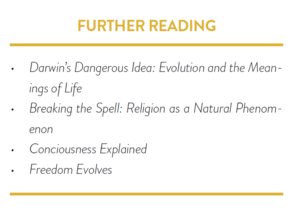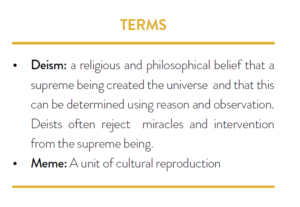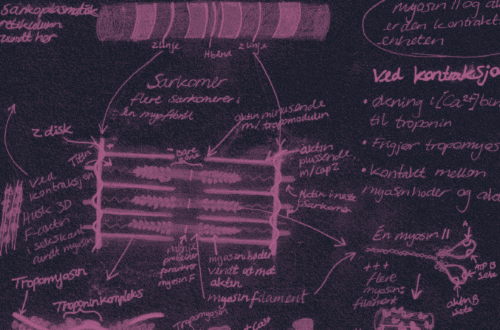“I am always amused when people say they can see how evolutionary biology can say something about a bird’s nest, but not about a poem. If you persist on thinking that a poem is a miraculous achievement, while a bird’s nest is not, you have a very distorted view of creativity.” Daniel Dennett is a lumbering character, he speaks slowly and eloquently, sitting hunched over a small table in a hotel lobby. He is one of the world’s most-read living philosophers, and is particularly well known for his books on the philosophy of evolution, consciousness, free will and religion. Dennett argues that evolution can shed light on all these phenomena.
Design without mind
Darwin had a strange inversion of reasoning in explaining how complexity can arise from chaos. Picture all organisms in a hierarchy. The greatest complexity at the top, and simpler as we go down. Dennett explains Darwins revolutionary idea as an algorithm, where the outcome is complexity and seeming design, all without magic or miracles. If the top of this hierarchy had been created from above, one could call the tool of this creation a skyhook. The top of the hierarchy comes  from something magically suspended even higher. Darwin realized a way that grounded «cranes» could lift and lift and create complexity from almost nothing and up, Dennett claims. Evolution can be seen as an algorithm since it meets three premises: substrate neutrality, underlying mindlessness, and guaranteed results. Evolution occurs in any system that has reproduction, heritability, and mutation – that is, undirected change. And it’s explanatory power is quite impressive: “Darwin gave us this wonderful idea that unifies everything from physics to poetry”, Dennett says passionately.
from something magically suspended even higher. Darwin realized a way that grounded «cranes» could lift and lift and create complexity from almost nothing and up, Dennett claims. Evolution can be seen as an algorithm since it meets three premises: substrate neutrality, underlying mindlessness, and guaranteed results. Evolution occurs in any system that has reproduction, heritability, and mutation – that is, undirected change. And it’s explanatory power is quite impressive: “Darwin gave us this wonderful idea that unifies everything from physics to poetry”, Dennett says passionately.
My soul is made of billions of tiny robots
Before his interest in evolution, Dennett studied philosophy under Van Quine. In spite of his classical philosophical training, he was curious about the physical premise for thoughts: the brain, how it works and what parts it consists of. A friend in medical school taught him about neurons. It struck Dennett that neural networks are exactly the sort of thing that can be capable of learning, of training themselves. He calls it his fundamental inversion: – Once I had it, I was off and running. Dennett was once asked if he believes he has a soul. He happily replied: «Yes, we have a soul! But it’s made of lots of tiny robots.»
Memes, genes, and lazy readers
Dennett has a large white beard and a mild face, and is often called «the atheist Santa Claus». He is also considered one of the four horsemen of the «new atheism» movement and is known as an intellectual brother of Richard Dawkins. But that’s not the only thing connecting him to Dawkins: Dennett is central in the development and promotion of memetics – meme theory – an idea originally proposed by none other than Richard Dawkins. Lighting up like an excited youngster, he talks about his first encounter with Dawkins’ ideas. – The Selfish Gene was my introduction to Dawkins. I’ll tell you a strange thing. Or not strange; sad. Or funny. When The Selfish Gene came out, I was going to read it. I asked a philosopher of science I knew: What about this Dawkins? He said «Oh, cheap pop science trash. Not worth your time.» Dennett smiles and says that he took his word for it. – It took 4 years before I read it. Maybe I’ve made some mistakes, but when someone says something very negative about a book nowadays, I think: I’ll check it out for myself.
Know your meme
One of Dawkins’ central insights in The Selfish Gene is that the mechanism of evolution also applies to cultural items. Ideas are replicated, changed, and passed on to others. The replicators – analogous to genes – in that case are our ideas. We house them in our brains, like genes in a body: the buzzwords, the jingles, the symbols. Then we spread them at will. Anyone with access to the internet should be aware of this sort of replication. The same mechanism can be invoked for fashion, pop songs, customs. These items have no «real» use to us, but still spread like wildfire because of their ability to hijack space in our brains and be shared with others. According to Dennett, and Dawkins, this is an important part of cultural evolution: “I have to persuade my colleagues in the humanities and social sciences that this is something to take seriously, but I also have to persuade a lot of evolutionary biologists. I’ve finally broken through to the latter simply by talking about words.” Dennett leans forward and explains that words have evolutionary trees, they mutate over time, spread geographically, and replicate. Words are also intricately designed, without design from above. “They must have been designed by evolution. But not by genetic evolution, and not by evolution alone,” Dennett explains and goes on: “Once evolutionary biologists realize that they’re going to have an evolutionary theory of words, then the idea that there are other things than words that can have the same origin doesn’t look so bad to them.”
Religion as a natural phenomenon
And it is not just words that fit into evolutionary processes. In his book Breaking the Spell, Dennett explains how religion can be explored as a natural phenomenon. Its origins also lie in memetics and evolution. Dennett says that a lot of the components of religion are very physical and in no way transcendent. “The items that one looks at when studying religion are unproblematically natural items. The Church doesn’t claim their communion wafers come from heaven. No, they’re bread! I’m sure the laws of supply and demand apply as much to communion wafers as they do to jelly beans.” One criticism of Dennett’s approach is that the heart and soul of religion is left out: Spirituality and God. Dennett, on the other hand, thinks not: “But no. You’re actually not leaving it out. Spirituality in the relevant sense should have nothing to do with the traditional mind/body problem.” He goes on: “There may be major differences in the psychology of those who are spiritual and those who are not, but it is not that the former have souls and the latter don’t,” Dennett chuckles into his beard.
Fitness-reducing education
Religion has evolved, argues Dennett, just like any other natural or cultural trait. Some traits have advantageous features that help the keeper of that trait to replicate – like the ability to have many healthy children. There are also evolved traits that do not have to be necessary or useful in any sense. They just have to be good at replication of themselves. Fitness is a term that quantifies this replicative ability, both for useful and non-useful traits. Some traits with high fitness spread easily, like a virus, but at the same time it can limit fitness on another level, for example the host’s own fitness; in our case, human fitness. A catchy pop song may have high fitness in itself, but no effect on the fitness of a carrier. Dennett claims religion is good at replicating in the human mind. He says there is an important difference between the fitness of a cultural item itself and its utility to us. Dennett enjoys having grandchildren, but it’s not the only important thing. “Besides, who cares about genetic fitness? If eating broccoli had the same demonstrable fitness-reducing effect as getting a college education – they would put a warning label on it. Very few things have a more potent and measurable impact on the likeliness of you having children, than a few years at the university,” smiles Dennett. “When I’ve held university audiences, people don’t run for the doors!”
Philophers aren’t doing philosophy
Other philosophers sometimes claim that Dennett is not doing philosophy any longer, that his explanations are too simplistic and too focused on empiricism. His book Consciousness Explained is sometimes jokingly called «Consciousness Explained Away» by colleagues, but Dennett does not feel the criticism hits the target. “I understand their eagerness to force my resignation from the club. But I think what I’m doing is what philosophy used to be and should be again. Philosophy isn’t that ivory tower enterprise that they call philosophy. We need to be taking a much harder look at the empirical realities, not just be working it out as we go along.”
![]()
Marit M. Simonsen har en mastergrad i evolusjonsbiologi ved Universitetet i Oslo.






